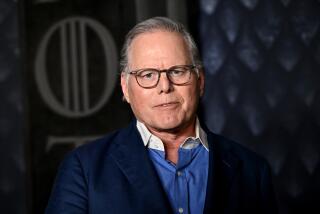TV executive Jamie Kellner, who helped create Fox and the WB, dies at 77

Jamie Kellner, a pioneering media executive who helped expand the world of broadcast television by creating Fox and the WB networks, died Friday. He was 77.
Kellner also oversaw CNN, TNT and TBS as chairman and chief executive of Turner Broadcasting System.
He died at his home in Montecito after a long battle with cancer, according to a spokesperson for the family.
Born in Brooklyn and raised on Long Island, Kellner first made a name for himself at Orion Entertainment Group, where he spearheaded an effort with Lorne Michaels to buy the rights to original episodes of “Saturday Night Live,” which were cut into 30-minute episodes and sold in syndication.
The lucrative partnership caught the attention of Rupert Murdoch and Barry Diller, who in the mid-1980s were plotting to launch an upstart broadcast network to rival the long-established “Big Three”: ABC, NBC and CBS. Kellner became the first president and chief operating officer of the Fox Broadcasting Co.
Launched in 1986, Fox was the first new network on American broadcast television since ABC in 1948.
Kellner poached a young NBC executive named Garth Ancier to run programming.
In a phone call Sunday, Ancier recalled Kellner as a formidable executive who “understood not just TV audiences, he also understood the entire way the TV system in the United States worked,” from affiliates to advertisers. Ancier, who also worked with Kellner at the WB, recalled flying to affiliates across the country, attempting to woo them to Fox.
At the time, few industry insiders thought Fox would have much staying power.
“My bosses — [NBC chief executive] Grant Tinker in particular — believed there would never be a fourth network,” Ancier said. “And they said, ‘On top of that, most of those stations they’re putting together are UHF,’ as if it was like the plague. It just meant we had to be different from the other networks.”
Kellner helped shape the network’s brand identity and make it a destination for edgier content, such as the bawdy family sitcom “Married … With Children” — a show that initially attracted controversy but became a long-running hit.
“One of the first tests we apply is: Would one of the three networks do this? And quite often, if the answer is ‘yes,’ then we disqualify it. There is no reason for us to exist if we are going to do what they have already done,” Kellner told the New York Times in 1986.
Fox attracted younger viewers with shows that bucked long-held industry convention, like “In Living Color,” the irreverent sketch comedy show featuring a predominantly Black cast; and “Beverly Hills, 90120,” a high school soap opera that became one of the defining shows of the 1990s.
“The whole reason we did ‘The Simpsons’ was because no one had done animation in prime time since ABC in the ’60s with ‘The Flintstones’ and ‘The Jetsons,’” Kellner said.
“The most important lessons we learned were to be different, to speak in a different voice than what was available to viewers already, and to get as young as you can get,” he told The Times in 1997.
He left Fox in 1993, just as the network was expanding into a seventh night of programming and had numerous buzzy hits like the “90210” spinoff “Melrose Place.” In just seven years, Kellner had turned a “rickety string of UHF affiliates into a significant competitor,” as The Times then put it.
He soon began shopping around an idea for a fifth broadcast network. In 1995, he launched the WB, which initially made its mark with Black sitcoms including “The Wayans Bros.,” “The Jamie Foxx Show” and “Sister, Sister,” but faced stiff competition from another would-be contender, UPN. “We wouldn’t be doing this if I didn’t believe this would be as successful, or more successful, than the Fox network,” he said early in the WB’s reign.
For the record:
6:34 a.m. July 4, 2024This article incorrectly states that “throughout the late ’90s, UPN leaned into teen-centered dramas.” This was the WB, not UPN.
One of the network’s first hits was the squeaky-clean family drama “7th Heaven.” Throughout the late ’90s, UPN leaned into teen-centered dramas and ushered in a golden age for young-adult programming that could be both sentimental and self-aware, with shows such as “Dawson’s Creek,” “Felicity,” “Gilmore Girls” and “Buffy the Vampire Slayer.” By 2002, the network, in which he had ownership stake, was valued at $1 billion.
“I think the magic of that place came so much from his form of leadership, which was about taking bets on people,” said Greg Berlanti, who was tapped at age 28 to become showrunner on “Dawson’s Creek” and created two other shows at the WB, “Everwood” and “Jack & Bobby.” He recalled Kellner as an executive who supported creative talent and gave shows time to grow but could also tell you “what five cities your show was most popular in.”
“I’m so glad I met that kind of leader at that age, someone who led with curiosity and compassion and was clear-headed and honest. He imbued people around him with a sense of faith in themselves,” he said.
Berlanti believes Kellner-era WB was “the most successful YA network in the history of television,” in part because Kellner “didn’t see it as a lesser audience.”
While still at the WB, Kellner was tapped to succeed Ted Turner as chairman and chief executive of Turner Broadcasting System, where he oversaw TBS, TNT and CNN. He angered wrestling fans in 2001 by canceling World Championship Wrestling programming on TNT and TBS. He presided over CNN during a period of seismic shifts in the news business, with increased competition from Fox News and MSNBC and the cataclysmic attacks of 9/11.
Kellner was known for fostering loyalty among his top executives, several of whom moved with him from network to network. “He gave you tremendous latitude as a boss and mentor, always empowering you to make bold, decisive decisions and never settling for what’s always been done,” said Brad Turell, who was head of corporate communications at Fox, the WB and Turner Broadcasting under Kellner.
Kellner retired from the business in 2004, when he was just 57.
“I found it hard to believe because he was so competitive, in the best sense of the word, and so vigorous. But when he was done, he was really done,” said Ancier.
Kellner remained busy pursuing passions like sailing and golf. He also opened a winery, Cent’Anni, in the Santa Ynez Valley, and was known for hosting Italian meals at his home.
He is survived by his wife, Julie Smith, daughter Melissa, son Christopher, and grandchildren Jake, Scarlett and Oliver.
More to Read
The complete guide to home viewing
Get Screen Gab for everything about the TV shows and streaming movies everyone’s talking about.
You may occasionally receive promotional content from the Los Angeles Times.






